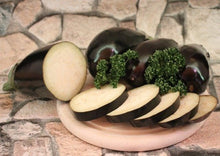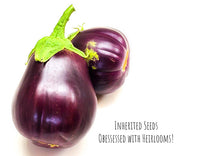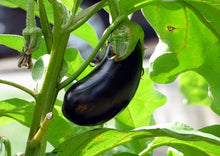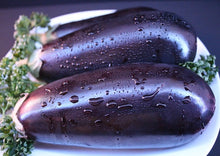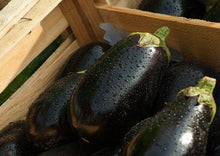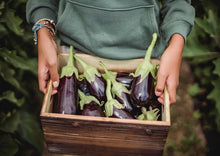
The "Heirloom Organically Grown Black Beauty Eggplant" is a highly sought-after variety of eggplant that is prized for its rich, deep purple color and robust, flavorful taste. This variety of eggplant is believed to have originated in India, where it has been cultivated for centuries as a staple crop in traditional farming communities.
One of the unique features of the Heirloom Organically Grown Black Beauty Eggplant is that it is grown using only natural, organic methods, free from the use of synthetic pesticides and chemical fertilizers. This not only results in a healthier, more nutritious product, but also helps to preserve the environment by avoiding the use of harmful chemicals.
The Black Beauty Eggplant is a versatile vegetable, it can be cooked in many ways including grilling, sautéing, and roasting, it can also be used in a variety of dishes such as ratatouille, baba ghanoush, and moussaka.
Eggplant is a very tender perennial grown as an annual due to weather conditions. One of the most popular heirloom variety, Black Beauty dates back to the early 1900s and has been a garden staple for over 100 years.
The plant bear loads of bell shaped, glossy, purple-black fruits. Each fruit can weigh to an average of 2.5 lbs. Black Beauty Eggplant grows well in many areas of United State and is one of a top choice for the southeastern states. The plant looks ornamental with its gorgeous fruits and purple blooms, making it a best choice for the edible landscape.
Early to mature, Black Beauty eggplants were a great hit and are well-suited option for those with shorter growing seasons. Additionally, compact and upright plants make them an ideal candidate for container culture.
Growing
Eggplant – also known as Brinjal grows wild in its homeland of South Asia as a perennial plant, though these warm-season vegetables are treated by most gardeners as annuals. Given their tropical and subtropical heritage, eggplants do require relatively high temperatures, similar to tomatoes and peppers (Nightshade family). They grow fastest when temperatures are between 70 and 85°F and very slowly during cooler weather. Like tomatoes and peppers, eggplants develop and hang from the branches of a plant that grows several feet in height. Because they need warm soil, eggplants are usually started indoors about two months in advance to get a head start. Raised beds enriched with composted manure are an ideal growing place for eggplants because the soil warms more quickly.
Planting
- Start seeds indoors about 8–9 weeks prior to the last spring frost. Seeds germinate quickly at temperatures between 70 to 90°F.
- Do not plant eggplant transplants into the garden until after the last threat of frost.
- Choose a very sunny spot for the best results.
- Eggplant grows best in a well-drained sandy loam or loam soil, fairly high in organic matter.
- Use a covering of black plastic mulch to warm soils before setting out transplants.
- Eggplant requires moderate amounts of fertilizer. Mix about 1” of well-rotted manure or a general fertilizer about a week before planting.
- If growing in pots, use at least 5-gallon pot per plant. Place it outdoor in full sun so it can be pollinated. Use premium soil mix to avoid disease.
- Stake the plants right away (just an inch or two from the plant) to provide support as they climb and to avoid disturbing the soil later.
- If you live in a cold climate, consider using row covers to keep the eggplants warm and sheltered. Open the ends of the row covers on warm days so that bees may pollinate.
- After planting, water well. Add a layer of mulch to retain moisture and suppress weeds.
Care
- Eggplant will fall over once loaded with fruit! Be sure to stake tall plants or use a cage to keep the plants upright.
- Pinch out the terminal growing points for a bushier plant. For bigger fruits, restrict to five or six per plant.
- Water well to moisten the soil to a depth of at least 6 inches so the soil is moist but never soggy.
- The critical period for moisture is during fruit set and fruit development. Mulching can help to provide uniform moisture & conserve water.
- Apply a balanced fertilizer twice during the growing season. Side-dress when the first fruits are about the size of a quarter. Note:Too much nitrogen may cause excessive vegetative growth.
Pests / Diseases
- Flea beetles are probably the most common pest, but a healthy eggplant should be able to withstand damage from their tiny holes. Damage is usually serious only on young seedlings. Grow plants under row covers until they are large enough to tolerate leaf damage.
- Powdery Mildew can affect eggplant. This appears as white, powdery spots on the leaves which may turn yellow and die. The best method of control is prevention. Plant where it receives full sun, and provide good air circulation. Water at the soil level, not on the leaves.
- Tomato Hornworms are sometimes an issue as are Colorado potato beetles, lace bugs, and mites.
- If the flowers on eggplants form but then fall off, or if fruit does not develop, the most likely problem is that the temperature is too cold.
- If the fruits are small and not growing, it’s also probably too cold. Eggplants like it hot! Daytime temperatures need to be 80° to 90° F and night time temperatures should not go below 60° to 65° F or their grow is very slow to stalled.
Click here to download our free vegetable growing guide
Heirloom eggplant, organically grown, Black beauty eggplant, origin, India, traditional farming, natural, organic methods, synthetic pesticides, chemical fertilizers, healthy, nutritious, versatile vegetable, cooking, grilling, sautéing, roasting, dishes, ratatouille, baba ghanoush, moussaka.






